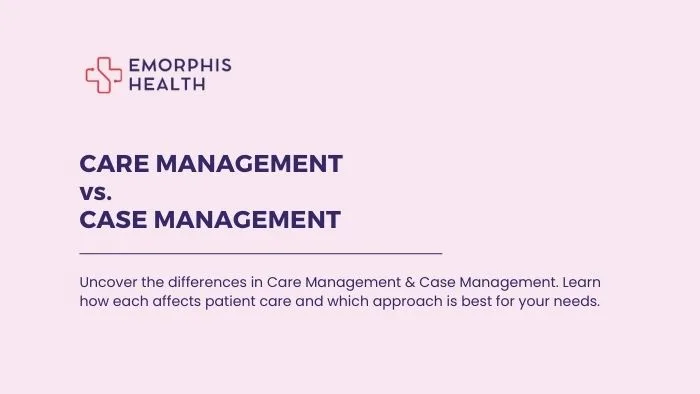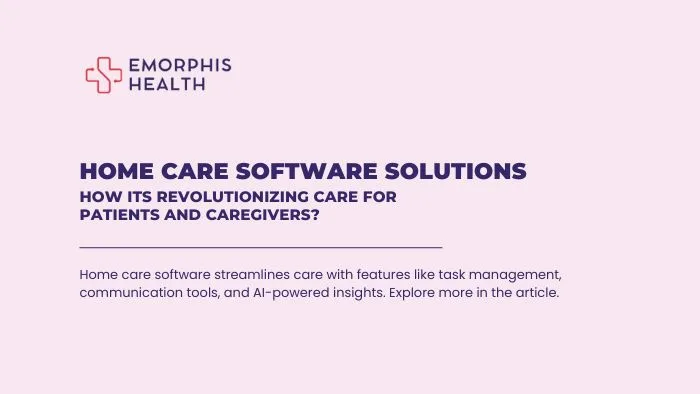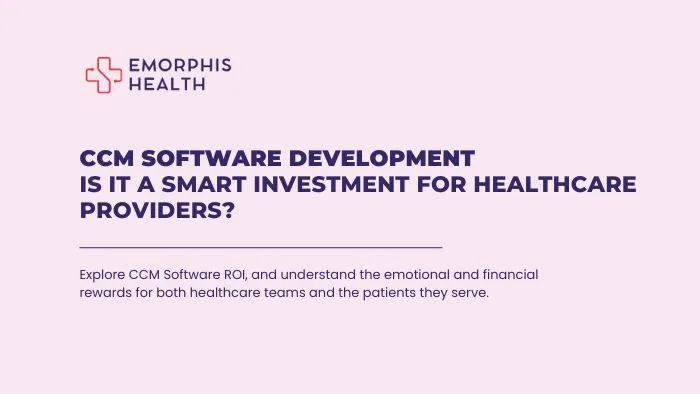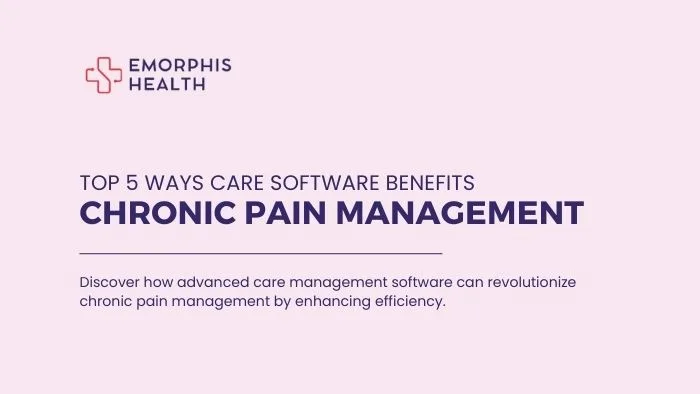Overview
See Contents
In the fast-paced world of healthcare, “care management” and “case management” are the buzzwords everyone’s tossing around—sometimes interchangeably, but are they really the same? In fact, they represent distinct approaches to patient care. Understanding the differences in Care Management vs. Case Management is essential for healthcare professionals and organizations aiming to optimize patient outcomes and operational efficiency.
What is Care Management?
Care management focuses on improving patient health outcomes by coordinating and facilitating the delivery of healthcare services. It is a holistic approach designed to manage chronic diseases, promote wellness, and enhance the overall quality of care. Key aspects of care management include:
- Patient-Centered Approach: Care management centers on the patient’s needs and preferences. It aims to create personalized care plans that align with individual health goals.
- Preventive Care: Emphasis is placed on preventive measures and early interventions to manage and mitigate health risks before they escalate.
- Coordination of Services: Care managers collaborate with various healthcare providers to ensure that patients receive comprehensive and coordinated care. This includes managing referrals, scheduling appointments, and facilitating communication among providers.
- Education and Support: Patients receive education on managing their conditions, understanding treatment options, and adhering to care plans. Support is also provided to help patients navigate the healthcare system.
What is Case Management?
Case management, on the other hand, is a process aimed at managing specific episodes of care, often involving complex or high-risk cases. It is more focused on addressing immediate needs and ensuring that patients receive appropriate care and resources. Key elements of case management include:
- Targeted Interventions: Case management typically addresses specific issues or needs within a defined timeframe, such as managing a patient’s transition from hospital to home or coordinating care for a particular condition.
- Resource Utilization: Case managers work to optimize the use of healthcare resources, including medical services, financial assistance, and community resources, to address the patient’s specific needs.
- Risk Management: Case managers assess and mitigate risks associated with complex cases, ensuring that patients receive timely and effective care.
- Follow-Up and Evaluation: Continuous monitoring and evaluation of the patient’s progress are conducted to ensure that care goals are met and to make adjustments as needed.
Key Differences – Care Management vs. Case Management
Understanding the nuances between care management and case management is crucial for optimizing patient outcomes and streamlining healthcare services. Here’s a more detailed examination of their key differences:
1. Scope and Focus
Care Management
- Broad Focus: Care management encompasses a wide range of activities aimed at improving overall patient health and managing chronic conditions. It addresses long-term health goals, preventive care, and wellness promotion.
- Chronic Disease Management: Care managers work with patients who have chronic illnesses, such as diabetes or hypertension, to create and implement long-term care plans that address multiple aspects of their health.
Case Management
- Targeted Focus: Case management is more narrowly focused on specific episodes of care, often addressing urgent or high-risk situations. It is concerned with immediate issues and short-term interventions.
- Complex Cases: Case managers often handle complex cases, such as patients transitioning from hospital to home or those requiring coordination of multiple services due to severe health conditions.
2. Patient Interaction
Care Management
- Ongoing Engagement: Care management involves continuous, proactive interaction with patients. It seeks to establish long-term relationships, monitor health progress, and adjust care plans as needed.
- Health Coaching: Care managers provide ongoing support and education to help patients manage their health conditions effectively and make informed decisions about their care.
Case Management
- Specific Interventions: Case management typically involves focused interactions related to specific problems or needs. The engagement is often more intensive but for a shorter duration, addressing immediate concerns and coordinating services as needed.
- Crisis Management: Case managers may be involved in situations requiring urgent action, such as navigating a patient’s care during a medical crisis or resolving barriers to receiving necessary services.
3. Coordination vs. Intervention
Care Management
- Coordination: Care managers coordinate across various healthcare services and providers to ensure comprehensive and integrated care. They work to streamline the patient’s care experience and facilitate communication among different providers.
- System Navigation: They assist patients in navigating the healthcare system, managing appointments, and ensuring that all aspects of their care are aligned with their health goals.
Case Management
- Intervention: Case managers provide targeted interventions to address specific issues or gaps in care. They focus on resolving problems, such as securing financial assistance or arranging for homecare services.
- Resource Optimization: They work to maximize the use of available resources and services to meet the patient’s immediate needs and address any barriers to care.
4. Goals and Outcomes
Care Management
- Long-Term Health Improvement: The primary goal of care management is to enhance overall health and well-being, reduce the risk of disease progression, and promote a higher quality of life.
- Preventive Health: Emphasis is placed on preventive measures and health maintenance to avoid future health complications and improve long-term outcomes.
Case Management
- Issue Resolution: The focus is on resolving specific issues or challenges that arise within a defined care episode. Case managers aim to address and mitigate immediate problems and risks associated with the patient’s care.
- Efficiency and Effectiveness: The goal is to ensure that the patient receives the necessary care and services on time, optimizing the use of resources and reducing potential complications.
5. Role and Responsibilities
Care Management
- Role: Care managers often work in roles such as health coaches, care coordinators, or patient navigators. They are involved in designing and implementing comprehensive care plans.
- Responsibilities: Their responsibilities include monitoring patient progress, providing education and support, coordinating care across different settings, and facilitating patient engagement.
Case Management
- Role: Case managers typically work in roles such as case coordinators or case workers, focusing on managing specific episodes of care and addressing immediate needs.
- Responsibilities: Their duties involve assessing patient needs, coordinating with healthcare providers and community resources, and managing the logistical aspects of care to resolve specific issues.
6. Documentation and Reporting
Care Management
- Comprehensive Documentation: Care management involves detailed and ongoing documentation of the patient’s health status, care plans, and progress. Reports often include a broad view of the patient’s overall health and long-term goals.
- Health Records: Documentation includes care plans, patient interactions, and outcomes related to chronic disease management and preventive care.
Case Management
- Focused Documentation: Case management documentation is more focused on specific episodes of care. Reports typically address the immediate issues, interventions, and outcomes related to the case.
- Case Notes: Documentation includes case-specific details, such as service utilization, resource allocation, and resolution of problems or barriers.

Here’s a table format outlining the key differences between care management and case management.
Care Management vs. Case Management
| Aspect | Care Management | Case Management |
| Scope and Focus | Broad focus on overall health and chronic disease management. | Targeted focus on specific episodes of care or high-risk cases. |
| Patient Interaction | Ongoing, proactive engagement with patients for long-term health improvement. | Focused interactions addressing immediate needs or crises. |
| Coordination vs. Intervention | Coordinates and integrates various aspects of patient care across multiple providers. | Provides targeted interventions to address specific problems or gaps in care. |
| Goals and Outcomes | Aims to improve overall health, enhance quality of life, and prevent disease progression. | Focuses on resolving immediate issues, optimizing resource use, and managing risks. |
| Role and Responsibilities | Care managers design and implement comprehensive care plans, monitor patient progress, and provide education. | Case managers handle specific episodes of care, manage logistical aspects, and address immediate needs. |
| Documentation and Reporting | Comprehensive documentation of long-term health plans, patient interactions, and progress. | Focused documentation on specific case details, interventions, and outcomes. |
| Example Scenarios | Managing chronic conditions like diabetes, coordinating long-term care plans, and preventive health strategies. | Hospital discharge planning, crisis intervention, high-risk pregnancy management. |
This table summarizes the key distinctions between care management and case management, highlighting their different focuses, roles, and approaches in patient care.
Examples of Care Management vs. Case Management
To better understand the practical applications of care management and case management, it’s useful to look at specific scenarios where each approach is applied. Here are illustrative examples of both:
Examples of Care Management
Chronic Disease Management
- Scenario: A patient with diabetes is enrolled in a care management program.
- Care Manager’s Role: The care manager works with the patient to develop a personalized care plan that includes regular monitoring of blood glucose levels, dietary adjustments, exercise recommendations, and medication management. They schedule regular follow-up appointments, provide education on diabetes management, and coordinate with the patient’s primary care physician and endocrinologist.
- Outcome: The patient gains better control of their blood sugar levels, reduces the risk of complications, and improves their overall quality of life through consistent monitoring and preventive care strategies.
Heart Failure Management
- Scenario: A patient with heart failure is referred to a care management program after being discharged from the hospital.
- Care Manager’s Role: The care manager assesses the patient’s understanding of their condition, helps them adhere to a low-sodium diet, monitors fluid intake, and ensures they follow their prescribed medication regimen. They also coordinate with cardiologists and arrange for home health visits to monitor the patient’s condition.
- Outcome: The patient experiences fewer hospital readmissions and manages their condition more effectively due to ongoing support and coordination of care.
Maternal and Child Health
- Scenario: A pregnant woman with a history of high-risk pregnancies is enrolled in a care management program.
- Care Manager’s Role: The care manager coordinates prenatal care appointments, provides education on healthy pregnancy practices, and arranges for additional screenings and specialist consultations as needed. They also offer support for any social determinants of health affecting the patient.
- Outcome: The patient has a healthier pregnancy and a better understanding of how to manage their health and the health of their baby, leading to improved outcomes for both mother and child.
Examples of Case Management
Hospital Discharge Planning
- Scenario: A patient who has undergone major surgery is preparing to be discharged from the hospital.
- Case Manager’s Role: The case manager coordinates the patient’s transition from hospital to home. This includes arranging for home health care services, setting up follow-up appointments with specialists, and ensuring the patient has the necessary medical equipment and medications. They also address any barriers to the patient’s care, such as transportation or financial concerns.
- Outcome: The patient transitions smoothly from hospital to home, with all necessary services in place to support their recovery and reduce the risk of complications or readmission.
High-Risk Pregnancy
- Scenario: A patient with a high-risk pregnancy is experiencing complications and needs specialized care.
- Case Manager’s Role: The case manager coordinates between obstetricians, maternal-fetal medicine specialists, and other healthcare providers. They ensure that the patient receives the necessary diagnostic tests and treatments, manage referrals, and provide support for any additional needs such as counseling or social services.
- Outcome: The patient receives coordinated care tailored to their specific complications, improving the chances of a successful pregnancy outcome.
Mental Health Crisis
- Scenario: A patient experiencing a mental health crisis requires immediate intervention and support.
- Case Manager’s Role: The case manager assesses the patient’s immediate needs, arranges for emergency psychiatric evaluation, and coordinates with mental health professionals to develop a crisis management plan. They also connect the patient with community resources for ongoing support and follow-up care.
- Outcome: The patient receives timely and appropriate intervention during the crisis, with a plan in place for continued care and support to address underlying mental health issues.
Conclusion
While both Care Management vs. Case Management play crucial roles in the healthcare system, their distinct approaches and focuses cater to different aspects of patient care. Care management provides a broad, ongoing approach to improving overall health and managing chronic conditions, while case management addresses specific, often urgent, needs and coordinates resources to resolve immediate issues. Recognizing these differences can help healthcare professionals and organizations better tailor their strategies to meet diverse patient needs and achieve optimal outcomes.
If you’re looking to elevate your healthcare operations with cutting-edge software solutions, look no further. At Emorphis Health, our team of health experts is dedicated to developing innovative healthcare software tailored to your unique needs. Whether you’re aiming to streamline patient management, enhance care delivery, or integrate advanced technologies, we have the expertise to turn your vision into reality.
Connect with us to explore how a bespoke solution can transform your healthcare practice, improve outcomes, and drive efficiency. Let’s collaborate to shape the future of healthcare together.








